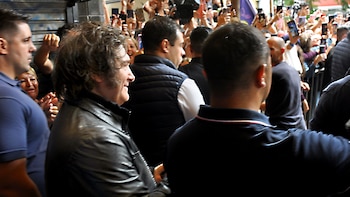
(ATR) Rugby World Cup 2011 CEO Martin Snedden tells Around the Rings he expects the final between New Zealand and France to put a perfect end to six weeks of success.
Snedden spoke with ATRjust days before kickoff to look back at the tournament's first five weeks as well as ahead to Sunday's showdown.
In the following Q&A, he sets the stage for the All Blacks versusLes Bleus, previews their styles of play and, of course, picks a winner. Read on for his prediction.
Around the Rings: What's the mood like right now in New Zealand? I assume the anticipation must be wild ahead of Sunday's final.
Martin Snedden: The mood of the nation is very buoyant and very excited. For us, it's the perfect scenario, which is having the home team in the final, a home team that hasn't won the Cup in a long, long time.
There are expectations now that maybe a dream is going to come true on the field, and that's with the backdrop of everybody – New Zealanders and otherwise – taking the view that this has been a very successful tournament.
ATR: This weekend will be an exact repeat of the 1987 RWC when you likewise had New Zealand and France in the finals and Wales playing Australia for third and fourth place. Should we read anything into this, and is such continuity good or bad for the sport of rugby?
MS: I think it's coincidence, but it's happy coincidence.
The reality here is that the finalists that we have this year are different than who the finalists were in 2007. There hasn't been a RWC where the defending champions have been able to go through and retain the Cup, so I think on the whole that's pretty healthy for the competition.
Once again, it has come down to a small number of nations that have a realistic chance of winning, but there has been a surprise package this time around with Wales. I think before the tournament when people were identifying who realistically had a winning chance, it sort of narrowed down to Australia, New Zealand, South Africa, England and France, and Wales didn't really get a mention, whereas this time around they've played really well and were a whisker away from being in the final.
ATR: There's been some controversy surrounding the refereeing, especially during the France versus Wales semifinal. Is this much ado about nothing?
MS: It would be impossible to go through a competition like this without there being controversy around refereeing. That's the nature of sport.
It’s natural where there are such high stakes that a team that perceives it’s on the wrong end of some decisions makes some comments about that. We had that in the first semifinal where the Welsh captain Sam Warburton was given a red card and sent from the field 17 minutes into the games.
The interesting thing for me is that while naturally the Welsh believe that was unduly harsh and that a yellow card should have been issued, I've noticed really that the vast majority of the media and public sentiment was that well, actually it wasn't overly unjust and that the player himselfshouldn't have put himself in that position.
You always expect refereeing controversy. You always expect a team that has lost to have a moment when they let their guard down and get stuck into whoever they perceive to have caused their own problems. I think this is by and large been relatively free of controversy. The refs have done a pretty good job on a whole, and certainly the guy who is refereeing the final, Craig Joubert, has had an outstanding tournament and has been one of the stars – not that he’s trying to be – but he’s definitely one of the stars of the tournament.
ATR: Finally, what style of play do you expect in Sunday’s final, and who are you picking?
MS: I think we're going to see from the French a very conservative style. That's been what they've done all tournament. They haven't really shown a great deal of flair. Instead, they've relied on strong forward power and strong defense and I think that's what they'll continue to rely on.
The All-Blacks won'tchange their game. They'll move the ball as much as they can. They'll make the best use they can of their backs. So it'll be two contrasting styles.
If the All Blacks are able to display the same intensity that they have in the opening stanzas of their first match against France and their semifinal against Australia, then I think they'll win comfortably. If the nerves overcome them, then the game will be close, but I just suspect there that they won't overly nervous, that they'll be quite relaxed about this, that they’ll be focused on this being their moment in time and my feeling is that then they’ll nail it.
ATR: Anything else you wanted to share with me?
MS: One of the features of the whole tournament has been the willingness of the people of New Zealand to take on and support all of the teams in the competition rather than just channeling all their energy into the All Blacks. That has resulted in the atmosphere in the stadia for all the matches being incredibly vibrant and something that we haven't generally experienced before in New Zealand and that's been something I think that the people have both contributed to and loved.
New Zealand has been through a very very hard last 12 months with earthquakes, with a mining disaster and with like the rest of the world the effects of an economic recession that has carried on longer than I think anyone expected it to, the event and the way it's played itself out has lifted the morale of the country enormously. There are always going to be arguments whether or not the cost of running this kind of event is worth it. It's impossible to tangibly measure morale, but it is absolutely crystal clear that this tournament has played a huge part in lifting the morale of the whole of New Zealand.
I think it’s been timely and I think it’s been incredibly welcome, and at the end of this people will just be walking around with smiles on their faces, and that's going to help them with normal life once they have to return to that next week.
Interview conducted by Matthew Grayson.
Últimas Noticias
Boxing’s place in the Olympics remains in peril as IOC still unhappy with the state of AIBA’s reform efforts
The IOC says issues concerning governance, finance, and refereeing and judging must be sorted out to its satisfaction. AIBA says it’s confident that will happen and the federation will be reinstated.

McLaren report to FIBA confirms abuses in the Mali women’s basketball program
The investigation could not “independently verify” allegations against FIBA president Hamane Niang, who has resumed his duties after stepping aside during the probe.

ATR Extra: 1st ISF U15 World School Sport Games – Belgrade 2021
Olympic Channel is live streaming the basketball, basketball 3x3, football, judo and wrestling competitions during the event, which runs September 11-19.

International Judo Federation bans Algerian athlete and coach for 10 years for refusing to fight an Israeli at Tokyo 2020
Judoka Fethi Nourine and his coach Amar Benikhlef admitted they were withdrawing from competition to avoid a potential match with Tohar Butbul of Israel.

IIHF bans Belarus hockey president for five years for code of conduct violations - Federation Focus
Also: no contested election for next ITTF president; BWF calendar shrinks as event in India cancelled due to pandemic; FISU announces early bids for 2027 and 2029 World University Games




